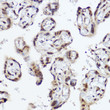| Tissue Specificity | Widely expressed. Expressed strongly in colorectal cancer cells (at protein level). Expressed strongly in colorectal cancer tissues compared to wild-type colon samples (at protein level). Expressed strongly in colorectal cancer tissues compared to wild-type colon samples. |
| Post Translational Modifications | Polyubiquitinated at Lys-145 by the SCF(FBXL17) complex, leading to its subsequent degradation. Ubiquitination is regulated by acetylation at Lys-228 and Lys-233. Polyubiquitinated by E3 ubiquitin-protein ligase TRIM48, leading to suppression of MAP3K5/ASK1 methylation and subsequent MAP3K5 activation. Acetylation at Lys-228 and Lys-233 regulates ubiquitination by the SCF(FBXL17) complex. Acetylated at Lys-233 by p300/EP300. Deacetylated at Lys-228 and Lys-233 by SIRT1. |
| Function | Arginine methyltransferase that methylates (mono and asymmetric dimethylation) the guanidino nitrogens of arginyl residues present in proteins such as ESR1, histone H2, H3 and H4, FMR1, ILF3, HNRNPA1, HNRNPD, NFATC2IP, SUPT5H, TAF15, EWS, HABP4, SERBP1, RBM15, FOXO1, CHTOP, MAP3K5/ASK1, MICU1 and NPRL2. Constitutes the main enzyme that mediates monomethylation and asymmetric dimethylation of histone H4 'Arg-3' (H4R3me1 and H4R3me2a, respectively), a specific tag for epigenetic transcriptional activation. May be involved in the regulation of TAF15 transcriptional activity, act as an activator of estrogen receptor (ER)-mediated transactivation, play a key role in neurite outgrowth and act as a negative regulator of megakaryocytic differentiation, by modulating p38 MAPK pathway. Methylates RBM15, promoting ubiquitination and degradation of RBM15. Methylates MRE11 and TP53BP1, promoting the DNA damage response. Methylates FOXO1 and retains it in the nucleus increasing its transcriptional activity. Methylates CHTOP and this methylation is critical for its 5-hydroxymethylcytosine (5hmC)-binding activity. Methylates MAP3K5/ASK1 at 'Arg-78' and 'Arg-80' which promotes association of MAP3K5 with thioredoxin and negatively regulates MAP3K5 association with TRAF2, inhibiting MAP3K5 stimulation and MAP3K5-induced activation of JNK. Methylates H4R3 in genes involved in glioblastomagenesis in a CHTOP- and/or TET1-dependent manner. Plays a role in regulating alternative splicing in the heart. Methylates NPRL2 at 'Arg-78' leading to inhibition of its GTPase activator activity and then the GATOR1 complex and consequently inducing timely mTORC1 activation under methionine-sufficient conditions. |
| Protein Name | Protein Arginine N-Methyltransferase 1Histone-Arginine N-Methyltransferase Prmt1Interferon Receptor 1-Bound Protein 4 |
| Database Links | Reactome: R-HSA-3214858Reactome: R-HSA-6804114Reactome: R-HSA-8936459Reactome: R-HSA-9009391Reactome: R-HSA-9018519Reactome: R-HSA-9694631 |
| Cellular Localisation | NucleusNucleoplasmCytoplasmCytosolLysosome MembraneMostly Found In The CytoplasmColocalizes With Chtop Within The NucleusLow Levels Detected Also In The Chromatin FractionUpon Methionine StimulationLocalizes To The Lysosome Membrane In An Nprl2-Dependent Manner |
| Alternative Antibody Names | Anti-Protein Arginine N-Methyltransferase 1 antibodyAnti-Histone-Arginine N-Methyltransferase Prmt1 antibodyAnti-Interferon Receptor 1-Bound Protein 4 antibodyAnti-PRMT1 antibodyAnti-HMT2 antibodyAnti-HRMT1L2 antibodyAnti-IR1B4 antibody |
Information sourced from Uniprot.org













